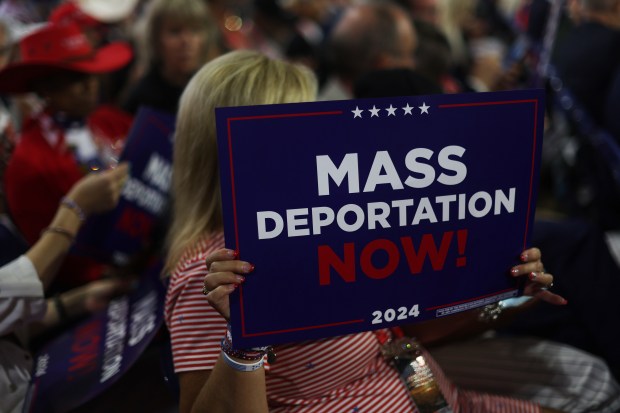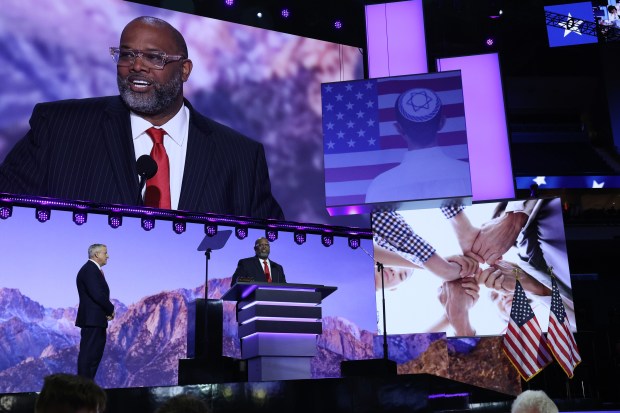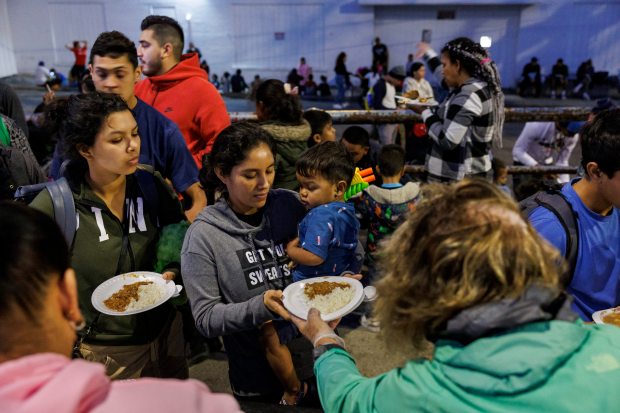During Donald Trump’s Wednesday visit to Chicago, the former Republican president was asked why he came.
“My message is to stop people from invading our country that are taking, frankly, a lot of problems with it,” Trump said while addressing a panel at the National Association of Black Journalists. “I will tell you that coming from the border are millions and millions of people that happen to be taking Black jobs.”
While he did not mention Chicago by name, looming over his answer was the yearslong migrant crisis that has deeply affected the fabric of the nation’s third-largest city and become a lightning rod for debate here over immigration policy under President Joe Biden. It’s part of a recent tactic the GOP has especially directed at Black voters in an attempt to lay the problem at the feet of Democrats.
Trump also leaned on a narrative of racial tension when questioning Vice President Kamala Harris’ identity as a biracial woman, generating his biggest controversy of the event. But throughout the half-hour appearance, the former president sought to bring the conversation back to immigration and warned that “the Black population is affected most by that.”
Mayor Brandon Johnson was quick to shoot down Trump’s theory.
Appearing at the NABJ meeting later that evening, the progressive mayor, who’s about to host the Democratic National Convention, sought to tie Chicago’s liberal values to Harris’ campaign and ripped what he called Trump’s attempts to pit marginalized Americans against each other.
“Keep in mind that this is not only an individual who lies, but he does it repeatedly,” Johnson said to the crowd. “Donald Trump wants us to believe that our battle is between low-wage workers and individuals with no wages. He wants us to believe that somehow our hopes and aspirations cannot be fulfilled. … He is so bad at what he does.”
A steady rise in rhetoric
Trump and the Republican Party have been zeroing in on immigration as a chief attack line during the 2024 election, and his Chicago appearance signaled that will continue with Harris at the top of the ticket.
The June debate between Biden and Trump featured the latter’s rollout of the line that migrants were taking “Black jobs.” Pressed in his Chicago interview with three reporters to define the term, he responded, “A Black job is anybody that has a job.”
At last month’s Republican National Convention in Milwaukee, Trump reiterated a vow to carry out mass deportations and sounded the alarm on high-profile cases of women allegedly killed by immigrants in the country without legal permission. His surrogates also spread conspiracies about widespread illegal voting by noncitizens in elections, which Trump repeated without evidence this week at the NABJ event.

Ameshia Cross, a Chicago-based Democratic political strategist who was in the audience during Trump’s panel, said she believes he was only using Black Americans as “pawns” to rile up his base.
“This was never a pitch to Black people. It was more so a pitch to the white people who love that messaging,” Cross said. “Because when he pitches and has these conversations, he’s never having them with Black people. He’s talking about Black people to white people.”
At the same time, the RNC gave Corey Brooks, a Black pastor from Chicago, a closing prayer slot on the second day of its convention as part of a wider strategy to increase the visibility of African American conservatives.
Recent polling has shown that Democratic Party support among Black voters — while still an overwhelming majority — was slipping before Biden dropped out of the race, posing an issue in several swing states. That erosion was especially pronounced for younger Black voters, who some experts posited felt disaffected by both parties.

Ald. David Moore, 17th, said he sees the cynicism firsthand in his majority-Black ward on the South Side — and believes much of that stems from the migrant crisis.
“What Trump is trying to do is appeal to those voters who so much have voted for Democrats but don’t feel like they’re getting the benefits,” Moore said. “There’s no way places like Englewood, West Englewood, should be looking like it’s still looking when you got a Democratic governor, a Democratic mayor.”
In fact, Moore himself said he himself had mulled sitting out November’s election when Biden was at the top of the ticket.
“Not that I was going to vote for Trump,” Moore, a Democrat, said. “I was at a stalemate, to tell you the truth.”
Chicago’s asylum-seeker mission
The humanitarian crisis surrounding the 45,700 asylum-seekers who have so far made their way to Chicago since 2022, mostly via bus from Texas under the direction of Republican Gov. Greg Abbott, has indeed inflamed tensions in the deeply segregated city.
Throughout the first year of Johnson’s term, high emotions frequently spilled out on the City Council floor over the migrant spending — frustrations that often came from Black aldermen who said they were not against caring for the largely impoverished group of Venezuelans but felt their own neighborhoods remained neglected.
“The community felt once again, everybody matters but us,” said Delmarie Cobb, a Democratic political strategist in Chicago. “All of those concerns are legitimate, but … Donald Trump doesn’t plan to address them. All he’s doing is using it as a wedge.”
City leaders say that tumultuous period has ebbed, for now. During a panel with Politico Illinois at the Hideout on Thursday, Johnson’s chief of staff, Christina Pacione-Zayas, cast Chicago’s evolving migrant shelter apparatus as a rejection of Trump’s comments on immigration.
“Chicago has literally been the model for the country in terms of how we’ve handled new arrivals,” Pacione-Zayas said. “Not perfect, right, but we certainly have basically built a system from nothing.”

The repeated warnings from Trump that undocumented immigrants are taking jobs from African Americans show Republicans hope to capitalize on economic anxiety within minority groups, though experts say there is little competition between Black workers and the recent migrants who have struggled to get federal work permits.
But the strategy has worked among other communities, said Joe Tafoya, an assistant professor at DePaul University who teaches Latino politics.
Tafoya said he has researched Spanish-language media and found that, particularly in Florida, there’s been a recent rise in radio, TV and social media promoting ideas that resemble the “Great Replacement” theory, which originated in white nationalist circles and claims without evidence that immigrants are purposely brought over to take over the white population. This time, the misinformation targeted Latino Americans, he said, adding that though the group remains mostly Democratic, in 2022 Florida Gov. Ron DeSantis won the Hispanic vote.
“What happened is that Trump is workshopping that idea,” Tafoya said about the NABJ remarks. “Trump did it strategically. I think that that idea has had some traction in other ethnic communities, and … Trump is probing to see if similar sentiment exists among African Americans.”
But Tafoya and others predicted that Chicago’s status as an immigrant-heavy city, which existed long before Trump’s rhetoric, will outlast him.
“Trump has always had it in for Chicago,” said U.S. Rep. Jesús “Chuy” García, who represents Little Village.
The city has become “a rallying point for divisive politics and for blaming some of the issues that we’re facing on immigrants,” García said. “They’ll try these things, as we saw on full display (Wednesday) with Donald Trump, but I don’t think that they will work.”
Originally Published:


